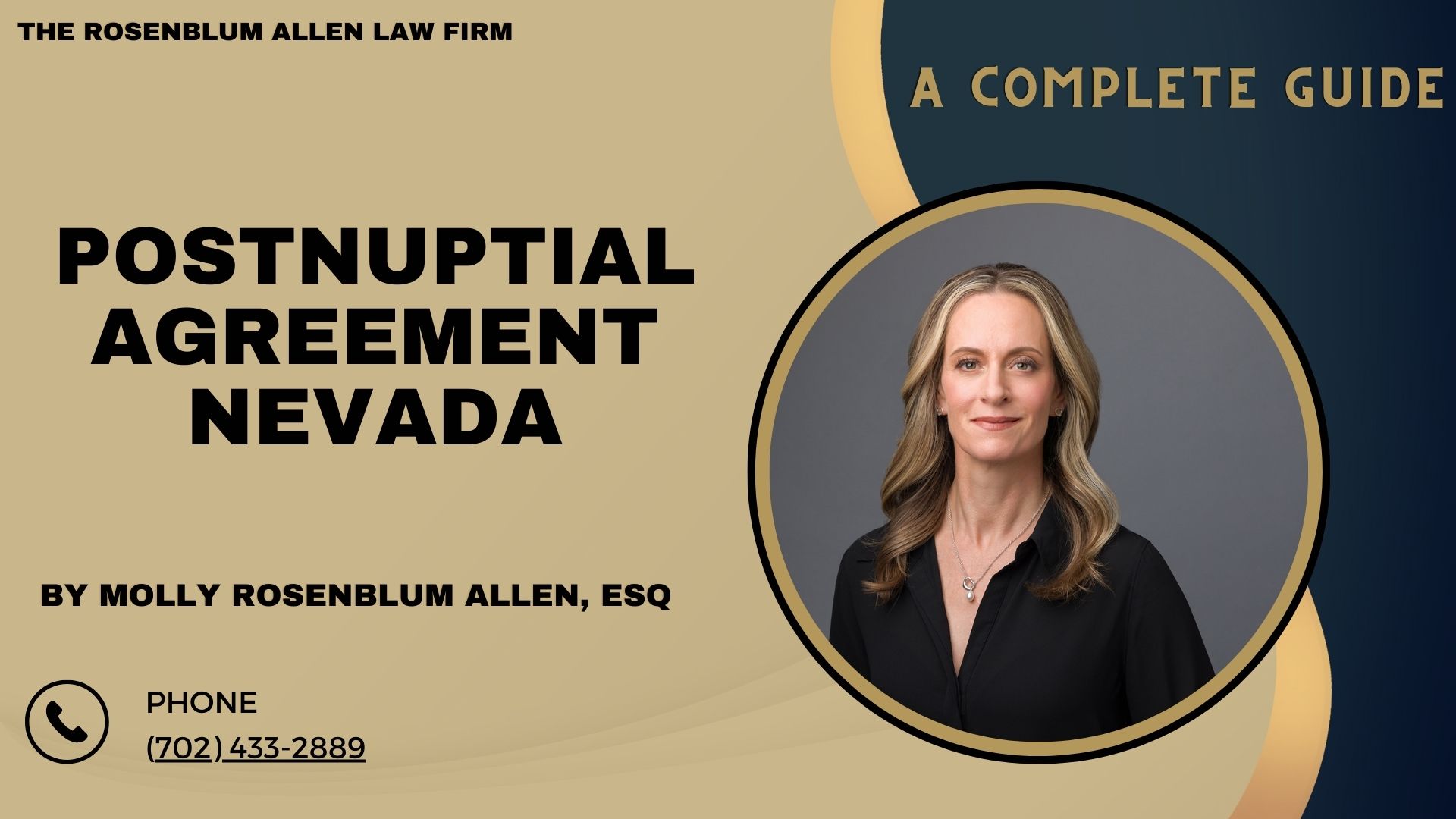Marital agreements are complex. But, knowing your options is the first step. It will help secure your future together or apart. In Nevada, postnuptial agreements let couples address money and property. They do so after they’ve tied the knot. This guide aims to explain postnuptial contracts in Nevada. It will give you the knowledge you need to make informed choices.

Understanding Postnuptial Agreements
Definition of a Postnuptial Agreement
It is much like its better-known counterpart, the prenuptial agreement. A postnuptial agreement is a legal document signed by a married couple. The main difference is in the timing. Couples make postnuptial agreements after the marriage. These agreements specify how the couple will handle their assets and debts. This happens if there is a divorce or if one spouse dies.
Difference between Prenuptial and Postnuptial Agreements: While both agreements serve similar purposes, the prenuptial agreement is signed before marriage, and the postnuptial agreement is signed after.
Legal Standing of Postnuptial Agreements in Nevada
Nevada law recognizes the validity of postnuptial agreements. But, they must meet rules for fairness and disclosure.
Overview of Nevada Laws Governing Postnuptial Agreements: Nevada is a community property state, which means that without an agreement, assets acquired during the marriage are generally divided equally in a divorce. Postnuptial agreements can alter this default rule according to the couple’s wishes.
Common Reasons for Drafting a Postnuptial Agreement
Couples choose to write postnuptial agreements for various reasons. These include, but are not limited to:
Protecting Individual Assets: This might include safeguarding an inheritance or business interests from being divided in a divorce.
Addressing Changes in Financial Status: Significant changes in one spouse’s financial situation, such as a substantial inheritance or a successful business venture, might prompt couples to draft a postnuptial agreement.
Preparing for Marital Reconciliation: Sometimes, couples on the brink of divorce will reconcile but wish to clarify their financial rights and obligations moving forward.
It is understanding the breadth and depth of what a postnuptial agreement can cover. It’s not just about who gets what. It’s about providing clarity and security for both partners, no matter what happens.

Critical Components of a Postnuptial Agreement in Nevada
A good postnuptial agreement in Nevada should cover many critical parts. This will ensure it meets the couple’s needs and follows legal standards. Knowing these elements can help couples craft an agreement. The agreement will truly reflect their intentions and offer peace of mind.
Assets and Liabilities
Identifying and sorting each spouse’s assets and debts is a key step. It’s part of creating a postnuptial agreement.
How to Identify and Categorize:
Assets include real estate, bank accounts, investments, and personal property.
Liabilities encompass debts like mortgages, car loans, and credit card balances.
It is crucial to organize these into marital and separate property. This is key for clarity and fairness.
Financial Obligations and Rights
A postnuptial agreement should clearly outline each spouse’s financial duties and rights. It should do so during the marriage and in a separation or divorce.
Spousal Support and Maintenance: The agreement can specify conditions under which one spouse might be entitled to financial support from the other, including the amount and duration of payments.
Division of Property
Determining how property will be divided is critical to any postnuptial agreement, especially in Nevada’s community property context.
Separate vs. Marital Property: The agreement should define separate property (owned before marriage or acquired as a gift/inheritance) and marital property (acquired during the marriage).
Child Support and Custody Arrangements
Child support and custody are mostly based on the child’s best interests. This is during separation or divorce. But, a postnuptial agreement can include parents’ intentions for these matters.
Legal Considerations and Limitations: It’s important to note that any provisions regarding children will be subject to review by a court to ensure they meet the child’s best interests.

Drafting a Postnuptial Agreement
Creating a postnuptial agreement is a process. It needs thought, open talk, and often legal help. This is to ensure it’s valid and enforceable.
Steps to Create a Postnuptial Agreement
Initial Discussions and Negotiations: Begin with open and honest conversations about your finances and how you both envision handling them now and in the future.
Consulting with a Legal Professional: It’s highly recommended to involve attorneys who can provide legal advice, ensure the agreement is equitable, and help navigate the complexities of Nevada law.
Legal Requirements for a Valid Postnuptial Agreement in Nevada
For a postnuptial agreement to be valid in Nevada, it must meet several criteria:
Voluntariness and Fairness: The agreement must be entered voluntarily by both parties without coercion or undue pressure.
Full Disclosure of Assets: Both spouses must fully disclose their financial situations to ensure the agreement is fair and informed.
Legal Representation and Advice: While not always required, having separate legal representation for each spouse can help protect their interests and support the agreement’s enforceability.

Challenges and Considerations
Drafting a postnuptial agreement in Nevada has its own challenges. There are many things to consider. It’s not just dividing assets; it’s about foreseeing and addressing potential issues proactively. Let’s delve into some hurdles you might encounter and how to navigate them.
Potential Challenges in Enforcing Postnuptial Agreements
Coercion or Undue Influence: Ensuring that both parties agree willingly and without pressure is crucial. Agreements signed under duress are not enforceable.
Lack of Transparency or Full Disclosure: Full and frank disclosure of all assets and liabilities is a cornerstone of a valid postnuptial agreement. Any omission can challenge the agreement.
Navigating these challenges requires honesty, openness, and, sometimes, a bit of negotiation. Remember, the goal is to reach a fair and equitable agreement for both parties.
Modifying a Postnuptial Agreement
Life is unpredictable, and circumstances change. Here’s how you can change your postnuptial agreement to reflect your current situation:
Circumstances Under Which Modifications Are Necessary: Significant changes in financial status, the birth of children, or relocation to another state might necessitate updates to your agreement.
Legal Process for Modification: Just like creating the original agreement, modifications should be made in writing, agreed upon by both parties and, ideally, reviewed by legal professionals to ensure they meet Nevada’s legal requirements.
Modifying your postnuptial agreement doesn’t mean your initial intentions were wrong. It just means you’re adapting to life’s changes together. This shows a strong and flexible relationship.

Breaking It All Down
A postnuptial agreement in Nevada isn’t just a legal document. It shows a couple’s shared respect and commitment to honesty in their relationship. Drafting, enforcing, or changing an agreement can seem scary. But, it’s really about protecting both partners and their future. This is true whether they stay together or not.
Embracing a postnuptial agreement can strengthen your relationship. It fosters open communication and sets clear expectations. The core of a postnuptial agreement is prep and protection. It ensures that, no matter what life brings, you’re ready to face it together or as individuals.

Frequently Asked Questions
What is the difference between marital and separate property in a Nevada postnuptial agreement?
Marital property includes assets and debts acquired during the marriage. In contrast, separate property refers to assets and debts. Each party brought them into the marriage or got them as gifts or inheritances.
Can a postnuptial agreement in Nevada cover future earnings and assets acquired after signing the contract?
Yes, a postnuptial agreement can say how it will treat earnings and assets acquired after the agreement if a spouse dies or there is a divorce.
Is a postnuptial agreement public record in Nevada?
No, postnuptial agreements are private contracts between spouses. They do not become public records unless submitted to a court in divorce.
How can a postnuptial agreement impact spousal support in Nevada?
A postnuptial agreement can set terms for spousal support. These include the amount and duration, as long as it’s fair and meets legal standards for enforcement.
What happens if we divorce in another state but sign our postnuptial agreement in Nevada?
Generally, a postnuptial agreement signed in Nevada will be valid in another state. Still, the agreement must follow the state’s laws. It must do so in the jurisdiction where the divorce is filed. It’s advisable to consult with a lawyer. They can help you understand how others may see it in a different place.
Can we include a clause about personal behavior or lifestyle choices in our Nevada postnuptial agreement?
You can include clauses about personal behavior or lifestyle choices. But, they are hard to enforce. A court may not uphold them. This is true if the court deems them irrelevant. They must be irrelevant to the marriage’s money or the children’s well-being.
How long does drafting and finalizing a postnuptial agreement in Nevada take?
The time frame can vary. It depends on your assets’ complexity. Also, on the negotiation’s length and how quickly you can give the needed information and reach an agreement. Generally, it can take anywhere from a few weeks to several months.
Do changes in Nevada law affect existing postnuptial agreements?
Old agreements are usually grandfathered under the old law. It was in effect when they were signed. But, big changes in the law could change how an existing agreement is interpreted or enforced. So, regular reviews are a good idea.
Can a postnuptial agreement be set aside or invalidated after signing it?
Yes, but only if certain things happened. For example, if one party did not fully disclose all assets. Or, if there was duress or coercion. Or, if the agreement is very unfair when enforced.
What steps should we take to amend or revoke our postnuptial agreement in Nevada?
Both parties must agree to the changes in writing to amend or revoke a postnuptial agreement. The change should follow the rules for the original agreement. This includes notarization and, ideally, review by separate legal counsel for each party.

Glossary
Asset: An asset refers to any property or item owned by an individual or entity. In the context of a postnuptial agreement, assets can include real estate, bank accounts, investments, personal property, and businesses.
Community Property: Community property is a legal principle in some states, including Nevada, where most property acquired by either spouse during the marriage is owned jointly by both spouses and is divided equally upon divorce, annulment, or death.
Coercion: Coercion involves applying pressure on someone to do something they would not typically do by using threats, intimidation, or some form of pressure. In legal terms, an agreement signed under coercion is invalid because it wasn’t entered freely and voluntarily.
Disclosure: Disclosure in the context of postnuptial agreements refers to each spouse revealing their financial information, including assets, debts, income, and expenses. Full disclosure is required for the agreement to be considered fair and valid.
Duress: Duress is similar to coercion and refers to a situation where one party is forced to sign an agreement against their will under threat of harm or undue pressure. Agreements signed under duress are not enforceable.
Enforceable: A court of law can uphold an enforceable agreement or contract. For a postnuptial agreement to be enforceable, it must meet specific legal requirements, such as being entered without coercion, with full disclosure, and, in some cases, with legal representation for both parties.
Equitable: Equitable refers to something fair or just. In legal contexts, it often means fair distribution or treatment that may not be precisely equal but is considered just under the circumstances.
Legal Representation: Legal representation involves having a lawyer or attorney provide legal advice and act on your behalf. In the context of postnuptial agreements, it’s recommended that each spouse have legal representation to ensure their interests are adequately protected.
Marital Property: Marital property includes assets and debts acquired by either spouse during the marriage and is subject to division upon divorce. It contrasts with separate property, which belongs to one spouse individually.
Notarization: Notarization is the process by which a notary public verifies the identities of the signers of a document, witnesses their signatures, and marks the document with a seal indicating that the signatures are valid. Notarization adds authenticity and legality to documents, including postnuptial agreements.
Separate Property: Separate property refers to assets and debts that belong to one spouse individually and were acquired before the marriage or received as a gift or inheritance during the marriage. Separate property is not usually divided between the spouses in a divorce.
Spousal Support: Spousal support, also known as alimony, involves financial payments made by one spouse to the other during or after a divorce. A postnuptial agreement can specify terms regarding spousal support, including its amount and duration.
Unconscionable: An unconscionable contract or agreement is so unjust or overwhelmingly one-sided in favor of the party with superior bargaining power that it is deemed unenforceable under the law.

Additional Resources for You
As you navigate through the complexities of postnuptial agreements and other family law matters in Nevada, remember that you’re not alone. Our lead attorney, Molly Rosenblum Allen, Esq., has created a suite of resources to assist you in your time of need. Each resource is designed to provide valuable information and guidance on various aspects of family law, ensuring you have the knowledge and support necessary to make informed decisions.
Las Vegas Family Law Attorneys: A comprehensive guide to understanding the scope of family law services offered by the Rosenblum Allen Law Firm, catering to all facets of family law needs in Las Vegas. Learn more.
Family Court Las Vegas: Insight into navigating the family court system in Las Vegas, offering practical advice for those embarking on legal family matters. Explore further.
Common Law Marriage in Nevada: An informative piece addressing the myths and realities of common law marriage in Nevada, helping you understand your rights and legal standing. Discover more.
Name Change Las Vegas: Guidance on the legal process for changing your name in Las Vegas, whether due to marriage, divorce, or personal choice. Read here.
Nevada Power of Attorney: Essential information on establishing a power of attorney in Nevada, ensuring your wishes are respected and your affairs are in order. Find out how.
How to File a Motion in Family Court: A step-by-step guide to filing motions in family court, empowering you to take action in your legal proceedings. Get started.
Family Court Mediation: An overview of the mediation process in family court, highlighting its benefits in resolving disputes amicably. Learn about mediation.
Unbundled Attorney: Information on the unbundled legal services offered by the Rosenblum Allen Law Firm, providing flexible and affordable legal assistance. Explore options.
Nevada Adoption: A resource for those considering adoption in Nevada, covering the legal process, requirements, and how to begin your journey to parenthood. Discover adoption.
Molly Rosenblum Allen, Esq., and the team at the Rosenblum Allen Law Firm are dedicated to providing you with the resources and legal expertise you need to confidently address your family law matters.

Outside Resources for You
American Bar Association (ABA) – A premier source for understanding legal issues, finding legal resources, and learning more about the legal process in the United States. Visit ABA.
National Association of Family Law Attorneys (NAFLA) – Offers resources and guidance for those navigating family law issues, helping you find reputable family law attorneys. Explore NAFLA.
American Academy of Matrimonial Lawyers (AAML) – Dedicated to providing leadership that promotes the highest degree of professionalism and excellence in the practice of family law. Discover AAML.
FindLaw for Families – Offers a wealth of information on family law topics, including divorce, custody, and postnuptial agreements, to help you understand your legal rights and options. Visit FindLaw for Families.
Avvo – Provides free legal advice, an extensive directory of lawyers, and a community where you can ask legal questions and get answers from attorneys. Explore Avvo.
National Council of Juvenile and Family Court Judges (NCJFCJ) – Specializes in providing judges, courts, and related agencies involved with juvenile, family, and domestic violence cases with the knowledge and skills to improve the lives of the families and children who seek justice. Visit NCJFCJ.
Justia – Offers free access to a wide range of legal resources, including case law, codes, legal articles, and an extensive directory of lawyers across the United States. Discover Justia.

A Special Message from Our Lead Attorney, Molly Rosenblum Allen, Esq

Dear Readers,
Thank you for exploring the resources. We’ve carefully compiled them to help you with your family law matters. We understand that navigating these waters can be hard. They can be overwhelming. We aim to provide thorough guidance to help you make informed decisions.
If you’ve found these resources helpful and want to take the next steps to fix your situation, I invite you to reach out. My team and I are here to listen. We aim to understand your unique situation and work with you to achieve your goals.
Please call us at (702) 433-2889 to get the ball rolling on your situation. We do not offer a free consultation. But, we pride ourselves on giving great service and expertise. We will guide you through this critical time in your life.
Warmest regards,
Molly Rosenblum Allen, Esq.


